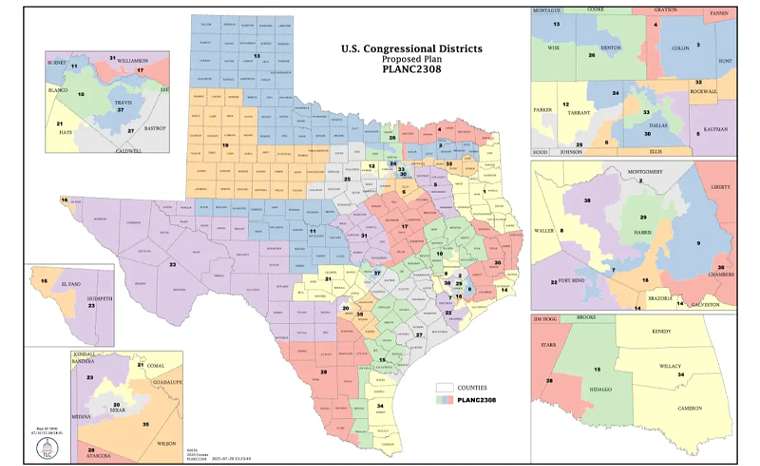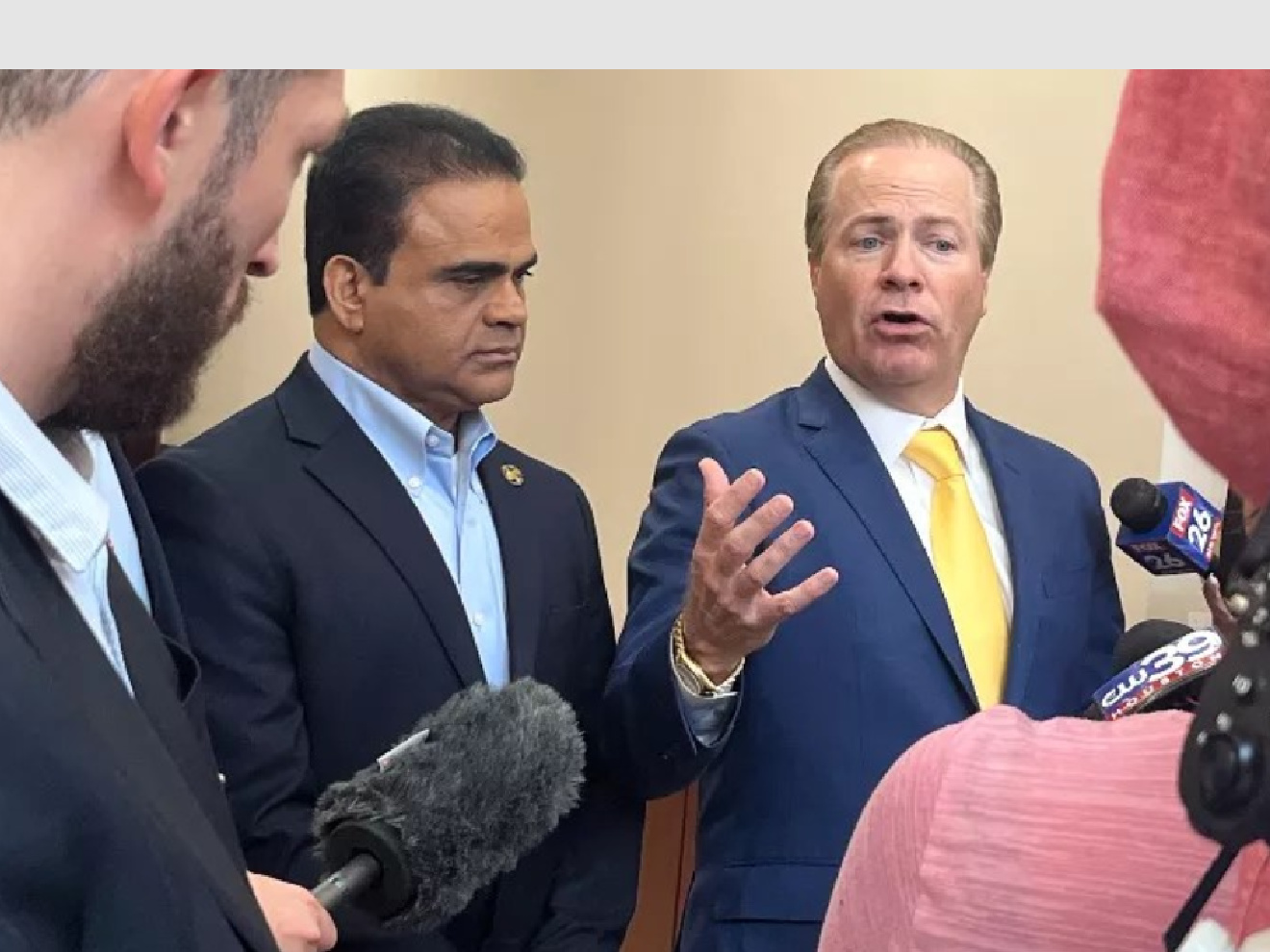Texas Party Leaders Vow to Continue Fight Over Redistricting Maps
Texas Republicans celebrated a victory last week as the House and Senate approved new congressional districts amid criticism that the lines are racially gerrymandered. But the success of the redistricting effort hinges heavily on whether previous GOP voters will stay true to their party in 2026.
House Bill 4, introduced by Rep. Todd Hunter, R-Corpus Christi, was approved August 20 in an 88-52 vote. During an eight-hour discussion in Austin, Hunter stood firm in his position that although mid-decade redistricting is unusual, it’s not illegal, nor is drawing new boundaries in an effort to gain more GOP congressional seats, which was his intent when he introduced the legislation.
The Senate adopted the new map along party lines in an 18-11 vote early Saturday morning. Sen. Carol Alvarado, D-Houston, was planning a filibuster but Republicans blocked it in a rare procedural motion that ended the debate.
“The One Big Beautiful Map has passed the Senate and is on its way to my desk, where it will be swiftly signed into law,” Gov. Greg Abbott said in a statement. “I promised we would get this done, and delivered on that promise.”
University of Houston law professor David Froomkin agreed that a state is entitled under existing federal law to engage in “extreme partisan gerrymandering for partisan advantage,” but it doesn’t appear that’s what’s happening, he said.
“If the state were in fact doing that, the map would be perfectly legal, but I think there’s strong reason to think that’s not in fact what the state has done,” he said. “They’re invoking that logic, but likely disingenuously. The premise underlying this redistricting plan was that there was a racial problem with the prior map that needed to be corrected.”
“That’s the position that the Department of Justice took in demanding that the state of Texas engage in this redistricting effort,” he added. “It’s a rationale that the governor accepted as the original justification for a mid-decade redistricting. Republicans backed off of that logic once it became clear that it would pose a legal obstacle to the new map. A court will have to determine whether the new rhetoric that the map is motivated by politics not race is the true motive.”
The U.S. Supreme Court ruled in the 2017 Cooper v. Harris case that the North Carolina General Assembly “used race too heavily” in redrawing two Congressional districts following the 2010 Census.
In modern-day Texas, Republicans originally theorized that the state’s prior congressional maps, approved after the 2020 Census, were racially gerrymandered and in order to resolve that problem, it was necessary to engage in race-conscious redistricting, Froomkin said.
Democrats were quick to point out that at the time the maps were approved in 2021, Republicans testified under oath that they were “race blind.”
The 2021 map is being challenged in federal court, with civil rights groups alleging they violate the Voting Rights Act of 1965. The U.S. Department of Justice was originally among the plaintiffs in that case and withdrew when Donald Trump became president.
“In fact, the state and the Department of Justice were incorrect to think that the prior map was a racial gerrymander,” Froomkin said, adding that he believes the map approved last week is a racial gerrymander. “To be clear, I also think they’ve violated section 2 of the Voting Rights Act, which is a separate issue but one that no doubt will be litigated.”
“It’s not just a power grab, it’s an attack on free society,” he added. “What Texas and other states are doing with these gerrymanders is trying to insulate an authoritarian government from democratic accountability.”
Texas Democrats — bolstered by constituents who oppose the map and party officials including former President Barack Obama, former Vice President Kamala Harris, and U.S. House Minority Leader Hakeem Jeffries — avoided voting on the map for about two weeks, fleeing the state to break quorum. A few Democratic legislators, including Rep. Jolanda Jones, D-Houston, didn’t come back. Those who did voted against the map and vowed to challenge it in court.
The new Texas map is poised to add five GOP seats in 2026 primaries, an effort to retain President Trump’s narrow majority in Congress. California Gov. Gavin Newsom promptly launched a redistricting effort in his state to add more blue seats and counter the effort in Texas. Under California law, this still has to be approved by voters in November.
The districts planned for a flip from blue to red are District 9 (held by Rep. Al Green of Houston), District 28 (held by Rep. Henry Cuellar of Laredo), District 32 (held by Rep. Julie Johnson of Farmers Branch), District 34 (held by Rep. Vicente Gonzalez of McAllen), and District 35 (held by Rep. Greg Cesar of Austin). At least six other districts were redrawn to improve GOP performance. Almost all of Texas’ 38 districts were altered.
“Four of the five new districts are majority-minority Hispanic,” Hunter said before last week’s vote in the House. “Each of these newly-drawn districts now trend Republican in political performance. While there’s no guarantee in electorate success, Republicans will now have an opportunity to potentially win these districts.”
The Texas House of Representatives approved new congressional districts on August 20, with Democrats vowing to challenge the map in court.
Texas Legislative Council
But the new map doesn’t guarantee Republican victories in the 2026 midterms, Froomkin said.
“The new map is premised on a guess about the voting behavior of Latino Texans, and that guess might turn out to be wrong,” he said. “The maps will go into effect. The question is, will the people put up with it? We can already see a backlash taking place. The Trump administration is horrifically unpopular. Guesses about how people are going to vote in 2026 based on the 2024 numbers may be misleading.”
Members of the Texas Majority PAC, which advertises that it is dedicated to electing a Democrat to statewide office, gathered for a Zoom call last week to analyze redistricting data. Katherine Fischer, director of the PAC, said Republicans will almost certainly flip Districts 9 and 32.
“We think it is possible, though challenging, to hold CD 35,” she said. “We think it is very possible to hold CD 28 and CD 34. Those are the Valley and South Texas ones. We believe that CD 15, which is currently a Republican district, will be the most competitive it’s been since 2020 redistricting and is a potential flip for Democrats.”
The strategy behind the new map is based on the assumption that Trump’s 2024 numbers are an accurate metric to determine how competitive the districts are, Fischer said, adding that she thinks the Republicans overplayed their hand.
“[Governor] Abbott was tasked with finding five new seats for Trump, but there are too many Democrats in Texas to gerrymander them away completely,” she said. “The data tells us that Texas Democrats can compete to hold most of these seats, and may have new flip opportunities. We intend to fight for every single seat.”
Former Texas Sen. Wendy Davis joined the call and said the maps reveal the likelihood that the GOP’s “voter suppression efforts” will backfire. “Communities that Republicans hoped to suppress are energized, and Democrats are ready to turn that energy into real, competitive elections,” she said.
Froomkin said once Governor Abbott signs the bill into law, the maps will be used for the 2026 midterm elections. No member of Congress loses their seat immediately but some, if not all, of the five Democrats in the seats slated for flips will not seek re-election in their now heavily Republican districts.
Rep. Al Green has said he could run in Congressional District 18, where a special election is planned in November to fill the seat vacated by Rep. Sylvester Turner’s death earlier this year. Harris County Attorney Christian Menefee, Rep. Jolanda Jones, and former Houston City Councilwoman Amanda Edwards are among more than 20 candidates who have filed for the CD 18 seat. Former candidates Corisha Rogers and Rain Eatmon dropped out of the race last week, saying they would endorse Menefee.
Referencing the fact that the 2021 map is still under review in federal court, Froomkin said such cases take a long time to adjudicate.
“They involve the presentation of a lot of factual information that takes time to gather,” he said. “I expect that Voting Rights Act challenges to the new map, similarly, will take a lot of time to adjudicate.”
While the plaintiffs won’t necessarily be just the Democratic lawmakers who fought fiercely against the legislation at the Capitol last week, many of those legislators are likely to be involved and are attorneys who appear prepared to gather technical information about the decomposition of districts and the voting behavior of those who live there.
Once the new map is approved, the case against the 2021 version doesn’t necessarily become moot just because it’s no longer in effect, Frromkin explained.
“It could be the case that a court would grant preliminary relief to plaintiffs challenging the new map and say that map can’t immediately go into effect, in which case the old maps, at least for the time being, would still be in effect,” he said.
Republicans Double Down
Prior to the passage of the bill, some GOP lawmakers appeared to be frustrated with their party leaders. Governor Abbott, Lt. Gov. Dan Patrick, Attorney General Ken Paxton, and Speaker of the House Dustin Burrows threatened to remove quorum-breaking Democrats from their seats, assess hefty fines, and arrest them. Not much of that has happened, leading some GOP legislators and watchdogs to believe that the party was rolling over for the Dems.
Letters were issued Friday afternoon notifying Texas House Democrats who fled the state that they’d have to pay about $9,000 each in fines for “impeding the action of the House.”
Shortly after the Speaker’s opening remarks early last week, the quorum breakers were asked to sign permission slips so a DPS trooper could tail them until the Legislature reconvened a couple of days later. Rep. Nicole Collier, D-Fort Worth, refused and spent two nights in the House of Representatives. At least six other lawmakers joined her on the second night.
When Collier went into a House bathroom for a Zoom call with Newsom and U.S. Sen. Cory Booker, D-New Jersey, during the August 20 floor debate, authorities accused her of committing a felony.
Froomkin, the law professor, said Abbott and other Republicans have made some threats, particularly that of criminal prosecution, that they weren’t authorized to make. And when the July 7 letter came from Trump’s Department of Justice strongly suggesting that Texas redraw its map, Abbott didn’t have to do it, Froomkin said.
“The governor clearly made a number of threats that were beyond his legal power,” he said. “It seems like those threats were effective. The Democrats returned sooner than a lot of people expected they would, and I think that is likely attributable to the governor’s threats of criminal prosecution, which I found shocking. The suggestion that state officials would use their official powers to persecute members of the opposition simply for taking positions on legislative matters is extremely unusual and disturbing.”
\“It seems like we’re entering a new era in politics in which incumbents try to use every ounce of their power in order to try to maintain their power,” he added. “There’s no doubt that the goal of the new map is straightforwardly to dilute and diminish the political power of communities of color, and it is part of a broader plan to do that on the national stage.”
But most Republican lawmakers have doubled down on the decision to redistrict, lauding the measure as a historic victory for the right and sharing their endorsements from Trump and Abbott.
Reps. Briscoe Cain, R-Deer Park, and Cody Vasut, R-Angleton, announced a celebratory dinner toasting the passage of the maps last week, and Cain promptly filed the day after the House vote to run for the newly drawn Congressional District 9.
Off to dinner to celebrate the hard work of @cvasut, Chairman of Redistricting & the House’s passage of the ONE BIG, BEAUTIFUL CONGRESSIONAL MAP! pic.twitter.com/Meav5hsmKk
— Briscoe Cain (@BriscoeCain) August 20, 2025
Burrows said when the House convened on August 18 that his responsibility now that a quorum was established was to maintain an atmosphere of decorum and respect until “the job is finished.”
“No one here needs a reminder that the last few weeks have been contentious,” he said, referencing the walkout of at least 50 Democrats in early August. “From this point forward, the rules of engagement are clear. Debate is welcome but personal attacks and name-calling will not be tolerated.”
Name-calling ensued almost immediately, primarily accusations from Democrats that the bill was racist and that some of its authors and supporters were too.
Hunter emphasized that the law allows redistricting for political performance. He repeatedly explained that the map was developed by Butler Snow LLP law firm at his direction and became frustrated with several Democratic legislators who questioned him about the process, saying they were permitted to interrupt and talk over him.
“I’m standing with Republican members,” he said. “What’s wrong with Republicans standing up and stepping up and being honest, which you don’t like? The Supreme Court says we can do political and partisan redistricting. We will not agree on this issue. We will push forward.”
Rep. Katrina Pierson, R-Rockwall, also took issue with the accusations.
“You call my voters racist, you call my party racist, but yet we’re expected to follow the rules,” she said. “Well, that double standard ends today. I have traveled all over this country for the better part of a decade and I can tell you that more and more minority voters are voting their values, not their skin color. And many of them are moving to Texas to escape the blue states because their values have been successfully gerrymandered into suppression.”
Rep. Katrina Pierson, R-Rockwall, said the new redistricting map is not racist but reflects the will of the people and the majority party.
Screenshot
Pierson further pointed out that Trump won Hispanic voters in Texas. “I get it, you don’t like that,” she said. “In 2024, Democrats lost. President Trump won big. You’re losing at the ballot box but you will not silence the majority in the state of Texas. You can throw your tantrum. You can leave, you can run, and you can ignore the will of the rest of the voters, but it’s honestly time to pick a new narrative. The racist rhetoric is old. News flash: Democrats do not own minorities in Texas.”
Many Democratic lawmakers allege the redistricting effort involves “packing and cracking,” or widening the GOP advantage by unconstitutionally compressing people of color into some districts while spreading them throughout others to reduce their ability to elect their preferred candidates.
It’s hard to predict what will happen in a legal battle because the U.S. Supreme Court has “sent some signals that the future of the Voting Rights Act of 1965 is uncertain,” Froomkin said.
“There are two cases before the Supreme Court that put the future of the Voting Rights Act in question,” he said. “In one of them, the court is planning to rule in a few months on the constitutionality of section 2 of the Voting Rights Act, and a number of experts expect that this court will be hostile to section 2. That will of course dramatically shake up the redistricting process, particularly in southern states like Texas.”
“In the absence of the Voting Rights Act, southern states would be able to completely gerrymander maps so as to deny minority communities any political representation, as they largely did before 1965,” he added.
The actions of the federal government in micromanaging state legislatures is unprecedented, the law professor added. “That is another really surprising development,” he said. “The Republican Party used to, at least rhetorically, be a party that embraced federalism. Today, a Republican administration is trying to aggrandize federal power at the expense of states, including by coercing states to participate in the federal executive’s agenda.”
What’s Next for Special Session No. 2
Sixty-nine bills were read into the record on August 18 and referred to committees. More followed throughout the week, ranging from THC regulation to STAAR test elimination. Most were aimed at improving emergency preparedness and enhancing youth camp safety standards, a response to the deadly July 4 Hill Country floods. Several have already passed at least one chamber.
Public hearings were held last week before the Select Committee on Flooding and Disaster Preparedness, at which several parents testified about the loss of their children at Camp Mystic during the Hill Country floods.
Democratic lawmakers criticized Republicans for not putting flood victims ahead of redistricting. Republicans said they could have passed bills sooner if the Democrats hadn’t fled the state.
Following the House passage of the redistricting bill, Abbott announced the addition of three more items to the special session agenda: Legislation imposing punishment for legislators who are willfully absent during a session; authorizing the purchase of Ivermectin over the counter; and proposing a groundwater study of East Texas aquifers by the Texas Water Development Board.
Burrows has said he hopes to finish the second special session by addressing all 22 items on the governor’s agenda before Labor Day weekend.

Reign Bowers is an outdoor enthusiast, adventure seeker, and storyteller passionate about exploring nature’s wonders. As the creator of SuperheroineLinks.com, Reign shares inspiring stories, practical tips, and expert insights to empower others—especially women—to embrace the great outdoors with confidence.






Post Comment